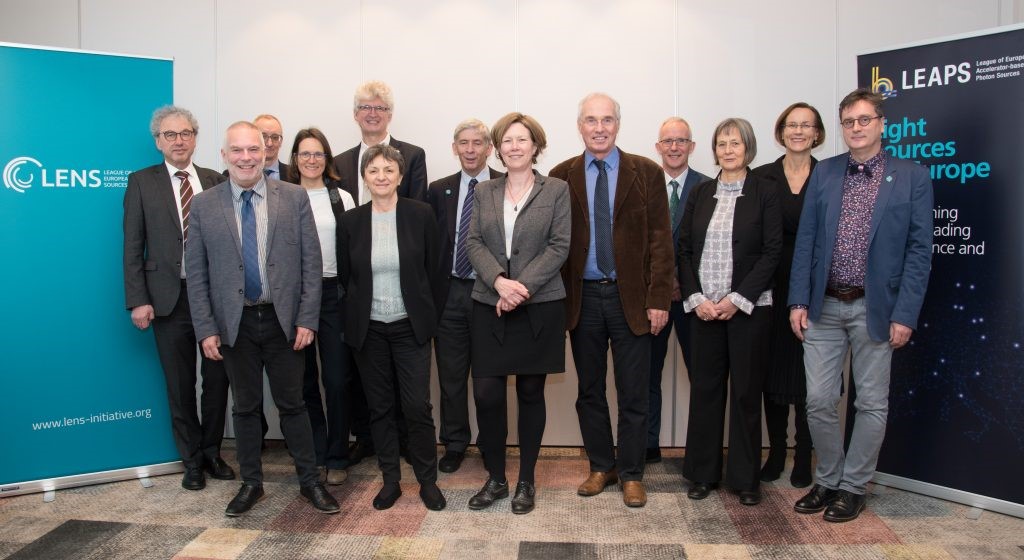
The two large European networks, together representing 28 large-scale analytical research facilities—including Europe’s premier synchrotrons, neutron sources and free-electron lasers—will begin a formal cooperation to advance their common strategic, scientific and technical goals.
The General Assemblies of the League of European Accelerator-based Photon Sources (LEAPS) and the League of advanced European Neutron Sources (LENS) have officially endorsed one another as strategic partners. This act puts the collective voice of 28 European large-scale light sources and neutron sources forward in the service of scientific research in advanced materials, biological systems and fundamental physics. As Europe confronts the global coronavirus pandemic and its aftermath, while ramping up for the ambitious objectives of the European Green Deal, this strategic partnership will amplify the essential contributions made by these research infrastructures and their 35,000-strong community of scientific users.
Common objectives, uncommon capabilities
“LEAPS is delighted to have LENS as a partner,” said LEAPS Chair and Director of Spain’s Alba Synchrotron Caterina Biscari. “We strongly believe in the benefits resulting from a close cooperation in many strategic and technological questions, such as liaising our contributions to tackle societal challenges, collaborating in the area of Big Data, and in strengthening our voice with both our national governments and the European Union.”
While Europe’s world-leading light sources and neutron sources have always had overlapping user communities, complementary scientific objectives and common technological needs, the LENS-LEAPS partnership represents the first collective high-level coordination between the two facility types.
“LENS and LEAPS share many of the same objectives and interface with many of the same political and scientific bodies,” said Helmut Schober, Chair of LENS and Director of Europe’s flagship neutron source, the Institut Laue-Langevin. “Both groups’ neutron and photon member facilities, together with their user communities, will benefit through coordinated scientific research programmes. But this is only the beginning, and we look forward to exploiting the potential that a strong partnership like this one represents.”
The scientific mission
The extraordinary technological and scientific capabilities of the 28 facilities behind LENS and LEAPS are the scientific backbone of Europe. This new strategic partnership will help to further leverage the decades of European investment these large-scale photon and neutron sources represent.
One motivating factor for LEAPS and LENS to join forces is the dawn of the EU’s 9th Framework Programme for Research and Innovation: Horizon Europe. The programme, which will run from 2021 to 2027, is expected to distribute some €95 billion in the service of completing five missions along the lines of curing cancer and regenerating the planet’s oceans before the end of the decade. Photon and neutron sources will be an essential part of the scientific contribution to these missions, and it is critical that they maintain support and are enabled to develop their capacity, underlying technologies and scientific capabilities as necessary.
LEAPS and LENS have already begun coordinating on Horizon Europe specifically, having worked together to help produce the Advanced Research Infrastructures in Europe (ARIE) joint position paper on the five Horizon Europe mission areas. This position paper, produced in cooperation with five additional RI networks, will be released this month, and gives a convincing overview of the vast array of scientific contributions across health and medicine, energy storage and conversion, smart engineering, Big Data and AI, quantum technologies, and of course fundamental research, that will continue to be made by European research infrastructures in the coming decades.
The League of European Accelerator-based Photon Sources (LEAPS)
LEAPS is a strategic consortium initiated by the Directors of the Synchrotron Radiation and Free Electron Laser user facilities in Europe. Its primary goal is to actively and constructively ensure and promote the quality and impact of the fundamental, applied and industrial research carried out at their respective facility to the greater benefit of European science and society.
The League of advanced European Neutrons Sources (LENS)
LENS is a non-profit initiative of European neutron facilities with the aim to strengthen European science by developing together with the European user associations a coherent strategy to meet current and future demands of the scientific communities. LENS places emphasis on the relationship between user communities and funding organizations, the continuous improvement of LENS facilities, and optimizing resources and aligning policies among the partners – all to ensure excellence to the communities they serve.





 A unique international forum for public research organisations and companies to connect their external engagement with strategic interests around their R&D system.
A unique international forum for public research organisations and companies to connect their external engagement with strategic interests around their R&D system.